
The Supreme Court of India has taken a significant step toward addressing the longstanding issue of unpredictable airfare fluctuations that have burdened Indian travelers for years. The apex court has formally asked the Central Government and the Directorate General of Civil Aviation (DGCA) to respond to a petition that seeks effective measures to control the volatile pricing of airline tickets.
Supreme Court's Directive to Government Authorities
The bench comprising Chief Justice D Y Chandrachud and Justice J B Pardiwala issued notices to both the Centre and DGCA, giving them time to prepare their responses to the public interest litigation (PIL). The petition, filed by former Rajya Sabha MP Sanjay Singh, highlights the severe financial strain that unpredictable airfare changes place on ordinary citizens, particularly during emergencies and peak travel seasons.
The court has scheduled the matter for further hearing in July, providing adequate time for the concerned authorities to thoroughly examine the issues raised and present their stance. This development represents a crucial judicial intervention in an area that has largely remained unregulated despite numerous consumer complaints.
The Core Issues with Airline Pricing in India
The petition brings to light several critical concerns regarding current airfare structures in the Indian aviation market. Unpredictable and often exorbitant price fluctuations have become a significant pain point for travelers, with ticket prices sometimes skyrocketing by 300-400% during festivals, holidays, or last-minute bookings.
This pricing volatility particularly affects passengers traveling during medical emergencies, family crises, or important occasions where travel plans cannot be postponed. The current system allows airlines to implement dynamic pricing models without any upper cap, creating situations where passengers pay vastly different amounts for the same seat on the same flight.
The absence of regulatory mechanisms to monitor and control these fluctuations has created an environment where airline companies can potentially exploit market situations at the expense of consumer interests. The petitioner argues that this constitutes a failure of regulatory oversight in protecting consumer rights within the aviation sector.
Potential Implications for Indian Travelers
If the Supreme Court's intervention leads to regulatory changes, Indian air travelers could witness several positive developments. The establishment of price bands or fare caps could bring much-needed stability to air travel costs, making budgeting for trips more predictable for both individual travelers and businesses.
Such regulations could also promote fairer pricing practices across the industry, ensuring that airlines cannot exploit temporary demand surges to impose unreasonable fares. This would be particularly beneficial for middle-class families, students, and emergency travelers who currently bear the brunt of unpredictable pricing.
The outcome of this case could potentially reshape the entire pricing framework of the Indian aviation industry, bringing it more in line with consumer protection principles while still allowing airlines reasonable profitability. The court's final decision, expected after the government and DGCA submit their responses, will be closely watched by all stakeholders in the aviation sector.
This judicial scrutiny comes at a time when air travel in India is expanding rapidly, with increasing numbers of citizens opting for flights over other transportation modes. The Supreme Court's attention to this matter underscores the growing importance of fair pricing practices in essential services and could set important precedents for consumer protection in other sectors as well.





